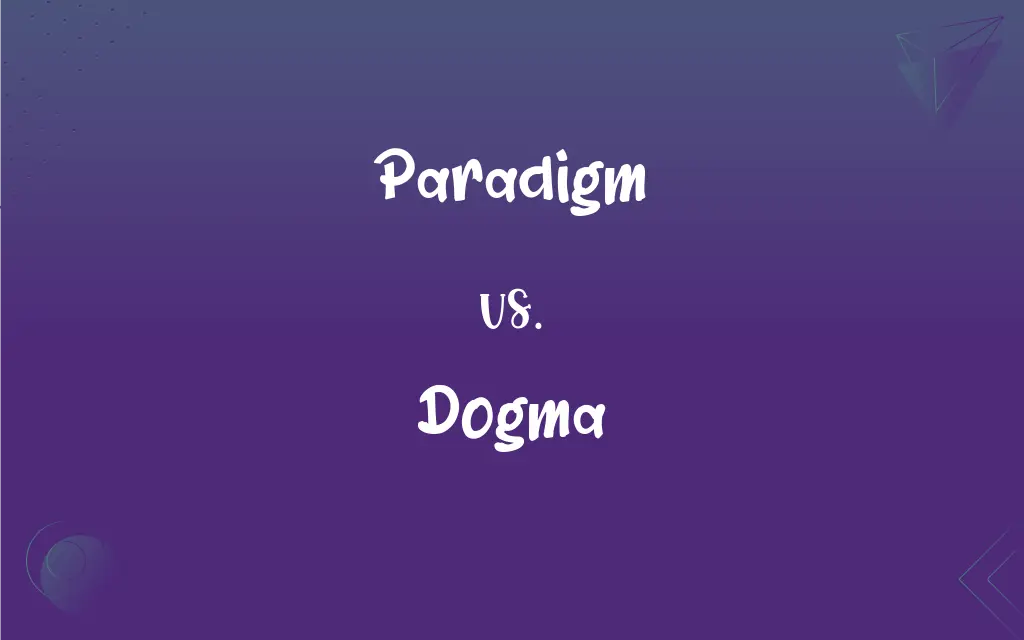Paradigm vs. Dogma: What's the Difference?
Edited by Aimie Carlson || By Harlon Moss || Updated on November 7, 2023
A paradigm is a typical example or pattern of something; a dogma is a principle or set of principles laid down by an authority as incontrovertibly true.

Key Differences
A paradigm is a framework containing the basic assumptions, ways of thinking, and methodology that are commonly accepted by members of a scientific community. Dogma, however, represents a set of beliefs or doctrines that are held by a religion or a group of people, often without being questioned or doubted.
Paradigms are subject to change and evolution as new discoveries are made, reflecting a shift in understanding or approach. Dogma, in contrast, is static and unchanging, demanding acceptance without the need for proof or evidence.
In science, a paradigm shift is a radical change in thought that leads to new ways of understanding or interpreting information. Dogma does not shift; it remains as a fixed point of belief or instruction from an authoritative source.
The use of the term "paradigm" extends beyond science to describe any set of experiences or thought patterns that define a particular perspective or discipline. Dogma tends to be more restricted in its use, typically associated with religious or ideological assertions that are considered authoritative and not open to dispute.
Paradigms provide models or frameworks for solving problems and making decisions within certain parameters. Dogma, on the other hand, dictates what is to be accepted as true in the absence of questioning, often serving as the foundation for moral judgments and religious laws.
ADVERTISEMENT
Comparison Chart
Definition
A standard example or pattern of something
A principle set by an authority as incontrovertibly true
Flexibility
Can evolve or change with new evidence
Generally unchanging and rigid
Application
Broad, in various fields like science or culture
Often specific to religion or ideology
Questioning
Open to questioning and debate
Not typically open to questioning
Role
Guides research and problem-solving
Provides a basis for belief and practice
ADVERTISEMENT
Paradigm and Dogma Definitions
Paradigm
A set of linguistic items that form mutually exclusive choices in particular syntactic roles.
The professor explained the paradigm of verb conjugations in Latin.
Dogma
A principle or set of principles laid down by an authority as incontrovertibly true.
The dogma of the political party was not open for discussion.
Paradigm
A theory or a group of ideas about how something should be done, made, or thought about.
His work offers a new paradigm for understanding the phenomenon.
Dogma
A doctrine or body of doctrines concerning faith or morals formally stated and authoritatively proclaimed by a church.
The council issued a new dogma that would guide the congregation's beliefs.
Paradigm
A model or pattern for something that may be copied.
The company is a paradigm of success in the industry.
Dogma
Something held as an established opinion; a strong belief.
It was her personal dogma that hard work pays off in the end.
Paradigm
A philosophical or theoretical framework of any kind.
Quantum mechanics is a paradigm that has led to numerous scientific breakthroughs.
Dogma
A fixed, especially religious, belief or set of beliefs that people are expected to accept without any doubts.
The ancient dogmas of the faith were recited at each service.
Paradigm
An outstandingly clear or typical example or archetype.
Her approach served as the paradigm for the entire research project.
Dogma
A point of view or tenet put forth as authoritative without adequate grounds.
He challenged the scientific dogma that had been accepted for decades.
Paradigm
One that serves as a pattern or model.
Dogma
A doctrine or a corpus of doctrines relating to matters such as morality and faith, set forth in an authoritative manner by a religion.
Paradigm
A set or list of all the inflectional forms of a word or of one of its grammatical categories
The paradigm of an irregular verb.
Dogma
A principle or statement of ideas, or a group of such principles or statements, especially when considered to be authoritative or accepted uncritically
"Much education consists in the instilling of unfounded dogmas in place of a spirit of inquiry" (Bertrand Russell).
FAQs
What happens when a dogma is challenged?
Challenging dogma can lead to controversy or reform within an institution.
What is dogma?
A principle set by an authority as incontrovertibly true, often in religion.
Do paradigms only apply to science?
No, paradigms can apply to any discipline or field of study.
Can paradigms change?
Yes, paradigms can change with new evidence or perspectives.
Is dogma open to change?
Dogma is usually not open to change and is accepted as absolute truth.
Can dogma be personal?
While typically institutional, personal dogmas can exist as strongly held beliefs.
What is a paradigm?
A typical example or pattern of something, especially in science.
What's a paradigm shift?
It's a fundamental change in approach or underlying assumptions.
How does a paradigm influence research?
It guides the methodologies and questions posed in research.
Can someone have a personal paradigm?
Yes, individuals can have personal paradigms that guide their views.
How rigid is dogma?
Dogma is typically rigid and resistant to change.
Where do we commonly find dogma?
Dogma is often found in religious or ideological contexts.
Can dogma be beneficial?
It can provide a stable foundation for communities of belief.
Can dogmas be questioned within their communities?
It depends on the community, but often they are not open to questioning.
What causes a paradigm to shift?
New discoveries or ideas that challenge the current model.
Do paradigms exist in the arts?
Yes, artistic movements often reflect prevailing paradigms.
Is dogma always religious?
Not always, but it's most commonly associated with religion.
Are paradigms useful in everyday life?
Yes, they help structure our understanding and expectations of the world.
How does one identify a paradigm?
By looking at the common patterns and beliefs in a field's practices.
How does one identify dogma?
By recognizing the authoritative statements deemed to be unquestionably true.
About Author
Written by
Harlon MossHarlon is a seasoned quality moderator and accomplished content writer for Difference Wiki. An alumnus of the prestigious University of California, he earned his degree in Computer Science. Leveraging his academic background, Harlon brings a meticulous and informed perspective to his work, ensuring content accuracy and excellence.
Edited by
Aimie CarlsonAimie Carlson, holding a master's degree in English literature, is a fervent English language enthusiast. She lends her writing talents to Difference Wiki, a prominent website that specializes in comparisons, offering readers insightful analyses that both captivate and inform.
































































